- Home
- Matt Hilton
Dead Men's Dust Page 21
Dead Men's Dust Read online
Page 21
“He could’ve made it out,” Rink offered. “Boats are generally moored closely together. Its likely he made it to another one and climbed out of the water.”
“I hope so,” I said.
“Funny thing is,” Barker said, “this other guy, the one who was with Telfer, apparently he did something extremely odd while he was on the yacht.”
“Apart from gutting someone with a knife?” I asked.
“Yeah. One of Carson’s bodyguards survived the explosion. He was pretty mangled up and not making much sense. He was off his head with pain and blood loss, but he kept on saying, ‘He stole my thumb.’”
I glanced sharply at Barker, who gave me a wry smile in return. “Apart from burns over much of his body, his wrist was cut open and he was missing a thumb. Of course, his injuries could’ve been caused by flying shrapnel from the explosion. Thing is, he was adamant that this mystery man picked his thumb up off the deck.”
“Jumpin’ Jesus,” Rink said, and I could only agree with him.
My theory about John crossing paths with this Harvestman was beginning to take greater shape. Only thing I couldn’t fathom was what that meeting meant to them. What was John doing going there with a murderer? Were they acting as allies, on some mad spree where they were working together? Or was John being compelled to work with this beast? I could only hope it was the latter. For everyone’s sake.
I didn’t realize I’d fallen silent, caught up in my own thoughts, until Rink nudged me. “You hear that, Hunter?”
“Uh? Hear what?”
“Rhet Carson? The guy who owned the yacht?”
I squinted at Rink in miscomprehension.
“I knew we’d lost you there,” Rink said.
“Sorry,” I said. “I was just thinking.”
“Yeah,” Rink said. “I could hear the cogs turning from here.”
I shook myself into the here and now. “So what did I miss?”
“Rhet Carson’s a major player. Head man of one of the outfits out here.”
“What? Like the Mafia?”
Barker gave a little laugh. “The Mafia doesn’t hold much sway any longer. Not if you’re looking for the old-time Godfather type. But you could say he was a key player in the local underworld. Nowadays your most successful mobsters shun the old-style Cosa Nostra methods. Carson’s a top-flight business executive. Runs his business from a downtown commercial center, even advertises on the cable networks.”
“His business being?” I asked.
“Banking,” Barker said. “But more specifically, moneylending.”
I said, “You telling me he was money laundering? What better front than to use your own bank?”
Barker snapped her fingers. “You’ve got it, my friend. There have been a number of high-profile investigations into his business, lots of supposition, but nothing that would stick. There was the rumor that he was laundering counterfeit dollars for some outfit from the East Coast, but the case never really got off the ground. He’s laid low for the last coupla years, kept his nose clean, spent more time on his boat. I’m thinking Carson was maybe about to get back in the business again.”
I’d had my suspicions since our last talk with Louise Blake. What the something big was that she’d referred to.
Forged money has never been a big problem in the U.S., obtaining decent paper being just about impossible. But I also knew that it was a ploy of some terrorist groups to flood countries with fake currency. Kind of destabilized the value of the dollar, bringing down the almighty American Dream. What they couldn’t achieve with bombs, they made up for in Mickey Mouse money. Petoskey and Hendrickson would have been making top dollar, selling to the enemies of the USA.
And Rhet Carson had wanted in on the action.
To Cheryl Barker, I said, “But without the drawback of being the middleman this time?”
“It’s a fair assumption,” Barker said.
“This outfit he was working with, do you know who runs it?” I asked.
“Not personally,” Barker said. “I suppose I can find out.”
“I might be able to give you a couple of names.”
“You already have your suspicions?”
“Yeah. A couple. Could be a guy called Sigmund Petoskey. He has his base in Little Rock, Arkansas.”
Barker shook her head at that. “Nah. The mob I’m talking about was rumored to be up in Virginia, maybe Georgia, I can’t recall.”
“How about Hendrickson?” I asked.
“Like I said, I don’t know the names personally. Hendrickson? Sounds familiar. I’ll find out.”
Rink gave Barker his cell phone number.
Barker, looking every bit the cowgirl, tipped the brim of an imaginary Stetson our way. “I’d best be on my way. Dallied a little too long. Dispatcher’s probably wondering if I’ve got myself shot dead and is already planning a search party.”
I shook hands with Barker, wondering if we’d ever cross paths again. Probably not. Then Barker and Rink hugged as if they’d been intimate once. I didn’t ask. Barker then turned to her car and slid behind the wheel. She gave us both an exaggerated wink. “I’ll be in touch.”
We watched her drive off, her vehicle almost concealed by the plume of road dust churned up by her wheels. After she was gone, we stood kicking our heels.
“So what’s the plan of action?” Rink finally asked.
“Marina del Rey’s about as good a place as any to start,” I suggested.
32
JOHN TELFER WAS LEAKING BLOOD. ORDINARILY THAT WOULD have been good. But not under these circumstances. Not when the bleeding got in the way of Cain’s plans. Not when it could alert a nosy observer to Telfer’s plight. Anyone with an ounce of brains would immediately tie a bleeding man to the recent events occurring at the not-too-distant harbor.
“We have to do something about your wound,” Cain said.
Lying flat on the bottom of the dinghy, Telfer grimaced up at him. Cain sat at the rear, guiding the outboard motor with one hand. With his other, he held the now-empty pistol aimed in Telfer’s direction. The waves were choppy, causing the rubber boat to lurch as it breasted each successive wave.
“Feeling nauseous?” Cain asked.
“What do you care?” Telfer grunted.
“I care. Isn’t that enough?”
Telfer twisted his face. “The only thing you care about is getting your hands on the money.”
“Not true. I also care about your well-being.”
“Yeah. Right.”
Cain shrugged. “Think what you will,” he said. He made another scan of the horizon. Off over his right shoulder, distant Catalina Island was wreathed in sea haze. He could see the ferry to the mainland chugging toward the harbor, and there were other boats on the water. There were a couple of yachts, a speedboat, and half a dozen chartered boats hauling groups of men off to favorite fishing sites. Thankfully, none of the boats appeared to be coast guard or LAPD. Equally thankfully, none of them was near enough for anyone to see Telfer lying in the bottom of the dinghy.
“Were you shot?” Cain asked.
Telfer ran a hand up his chest. He was tentative, expecting the worst. Finally, he shook his head. “I think it was more of a ricochet. Luckily whatever hit me didn’t go all the way in, just scored along my flesh. Hurts like a bugger, though.”
Cain nodded solemnly. Inwardly he was relieved. He didn’t want Telfer dying on him before he was ready. Still, he didn’t want Telfer to know that. The last thing he needed was for Telfer to start kicking up a commotion out here on the water. If Cain had to kill him, it could attract unwanted attention. And he didn’t relish attempting to outrun the coast guard in this paltry boat.
“As soon as we make land I’ll take a look at it for you,” Cain offered. “I know it’s only a couple of hours since, but it shouldn’t be bleeding now.”
Telfer rolled his shoulders. “It’ll be okay. I think I just opened the wound crawling into the boat.”
“Maybe so, but
it won’t harm you if I take a look.”
Telfer sighed. “Why’re you bothering?”
“Bothering? Because it’s important to me.”
Telfer shook his head. “You don’t give a shit about me. I know you’ve got no intention of upholding our bargain.”
“You can think what you like. Just ask yourself one thing. If I intended killing you, why would I bother saving you when I could as easily have left you on that yacht back there?”
“That’s easy. You needed me to carry the money.”
“So what about when you were in the water? I could’ve let you drown. It’d have been easier for me to take the briefcase than to haul your sorry ass to safety.”
Telfer thought about that one. In the end, he had no reply. Instead he asked, “So what exactly do you intend doing with me?”
“First things first, eh? First, we get to dry land. We clean you up. Then I’ll decide what happens from there.”
“What about this?” Telfer reached behind him and touched the briefcase he was using as a somewhat uncomfortable pillow.
Cain gave him a smile. “I’ll unburden you of that. You’re injured. It would be unfair of me to expect you to lug it around with you.”
“I’ve still got one good arm. It’ll be no problem, really.”
Cain laughed. “I like your sense of humor, John.”
“I’m not joking.”
“Regardless. You’re still a funny man.”
Telfer smiled at the thought. Even under the circumstances, he felt strangely pleased with himself. “You should see me when I’m happy. I’m the life and soul of the party.”
Cain shook his head, as though at the amusing antics of a toddler. He adjusted the outboard so that they began angling toward land. Here there was a stretch of golden shore, where beach houses on stilts crowned the low horizon. Beyond them loomed mist-shrouded tower blocks where the urban sprawl of South L.A. crept past Redondo Beach toward Long Beach. He selected one of the beach houses at random and headed for a wooden jetty that nosed out into the waves.
Beyond the jetty was a summerhouse; a playground for the not so rich judging by the way the paint flaked from the window frames. There was only one car, a battered Dodge sitting under the porch that abutted the southern side of the house, and no speedboat at the mooring point. The house had a semidilapidated edge, as though it were used infrequently, and maintained even less. There were no kiddies’ swings or toys strewn along the edge of the beach, and no sign of a family in residence at the stone-built barbecue, which contained only ashes and a lingering scent of burgers gone by. If anyone were home, it would be barely more than one—two at the most.
He deftly steered the dinghy up to the pilings, a lasso action snaring the boat to a stanchion. He used the threat of the gun to motivate Telfer. “Bring the briefcase,” he ordered. “I’ll take it off you when we get inside.”
“What if there’re people home?” Telfer asked.
“Then we impose on their generosity to get you fixed up.”
“That’s all?”
“What else?”
Coming to a painful crouch on the jetty, Telfer studied the empty windows. “You won’t hurt them, will you?”
Cain looked pained. “I thought you were beginning to understand me by now.”
“I am,” Telfer said. Then to himself, “That’s the trouble.”
“I heard that,” Cain said in singsong fashion.
“You were meant to.”
Cain’s features went from night to day in an instant. “I suppose it all comes down to whether or not they’re willing to be of assistance. I don’t care for selfish people. What about you, John?”
“I don’t suppose they have much choice when you’re pushing a gun under their noses.”
Cain shrugged.
“What if there are children?” Telfer continued.
“I haven’t killed a child lately,” Cain said.
Telfer didn’t reply, concentrating on shuffling by his nemesis to conceal his disgust. Cain allowed him to take the lead. He glanced down at the empty gun, considered its convenience as a tool, and decided that as long as no one suspected it was empty, it was still worth the effort to lug it along with him.
Telfer shuffled the length of the jetty, the briefcase stuffed beneath one armpit. Behind him, Cain grinned to himself. Telfer reminded him of a shambling mummy as he clawed at a railing to help him up the steps to the house. Beyond them the summerhouse presented a skull-like visage, dark empty eye sockets for windows and a grinning jaw of picket-rail teeth. It was an image that appealed to Cain but only added to Telfer’s apparent foreboding. He turned and gave Cain an imploring look.
“On you go, John. You’ve got nothing to worry about.”
Telfer shook his head. He set his shoulders, unresigned to the prospect of further violence. Cain nudged him in the small of his back but he resisted the push.
“You don’t have to kill anyone.”
“No,” Cain agreed. “I don’t have to.”
Telfer still refused to move.
Cain said, “But I might just start here and now if you don’t move your ass.”
A propane blaze of anger flushed Telfer’s face. Slowly he turned and faced his captor. Cain glared back. The tableau held for half a dozen heartbeats. “You know,” Telfer said, “the more you threaten someone, the less those threats mean.”
Cain grunted, but this time in humor. “You should know by now that I don’t make threats idly, John.”
“I’m fully aware of what you’re capable of. All I’m saying is that maybe you should take care who you direct those threats at. Sooner or later you’re going to have to do something about it.”
“Now who’s making threats?”
“No. Not a threat. Call it friendly advice.”
Cain winked. “Okay, John, I get you. Now do me the honor of getting yourself inside on your own two feet before I have to plug you and drag you in by your ears.”
“Another threat?”
Cain shrugged. “Call me Mr. Predictable.”
Telfer loped on ahead, and Cain glanced down and saw a pattern of dark splotches on the wood planks. Telfer was bleeding worse than he’d thought. Probably the reason for the bravado. A last-ditch attempt at showing he had a backbone after all. Following the trail, Cain lifted his gaze once more to Telfer’s shuffling form. Maybe patching him up was a waste of effort; maybe he should just end it now. Dead, he’d no longer be the hindrance he was proving. And he’d be more manageable stuffed in the trunk of the Dodge than up front riding shotgun. But that would mean changing the plans he’d fantasized over these past hours. Killed here with little fuss or later at the designated place with all the pomp and ceremony the occasion demanded? It wasn’t too difficult a choice. He followed on behind, his mind made up.
Although the house looked uncared for, the tiny yard was a different story. Bougainvillea in terra-cotta troughs made a pleasant border for the final approach to the front door. He curled his lip. Kind of spoiled the overall ambience. So, too, did the tinkle of piano music coming from beyond the screen door.
Exhaling at the homeliness of it all, Cain hurried so that he came to the door just as Telfer raised a hand to rap on the door frame. He was about to halt Telfer when the crunch of feet on gravel achieved that for him. Synchronized, they turned and greeted the man rounding the side of the house. Then they both glanced down at the Rottweiler that strained at the leash in his grasp. Telfer’s mouth held the ghost of a smirk as he looked at his captor.
“Help you gentlemen?” the man asked from ten feet away. He appeared to be about sixty years old, sunburned and paunchy. An early retiree on a short break. Cain would bet his right testicle that this man prefers to take his holidays in a mobile home. The massive dog continued to tug at the leash, tongue lolling in anticipation of a couple of tasty morsels.
In another sleight of hand, Cain spirited the gun into his waistband and his hand clapped down tight on Telfer’s shoulder
to halt any telltale movement. “Hopefully you can, brother,” Cain said, stepping past Telfer. “My friend here is injured. I’d appreciate it if you’d call 911 for us.”
“Need an ambulance?” the man asked, craning to see past Cain as though attempting to ascertain the severity of Telfer’s injuries. Subtly, Cain shifted onto his other foot. The blood on Telfer’s shirt was like a flashing light to the man. Eyes wide he lurched forward, aided by the pull of the heavy dog. “My God,” he spluttered. “You’re bleeding!”
Cain held up a hand. “Don’t worry, brother. It looks worse than it is. But we’d appreciate your help nonetheless.”
“Yes, yes,” the man said, coming forward at a trot. The dog bounced along at his side, no longer tugging at its leash. Cain gave the dog a nanosecond of perusal. He feigned alarm. Stepped away. The man saw the movement, gave a shake of his head. “Oh, don’t be worried about Popeye none. He looks scary, but really he’s a big old softie. More likely he’ll lick you to death than bite you.”
“Phew. That’s a relief,” Cain said. For Telfer’s benefit he raised an eyebrow, gave a lopsided smile. Telfer gave a short cough, but already Cain was dropping to a knee as if to greet the dog.
As the dog brushed past, Cain swiped his hand under its muzzle. An innocent enough looking pat of its broad chest. It took only two further paces before it collapsed. It didn’t even offer a startled yelp before it died. Stunned, the man stared down at his dog. Eyes pools of bewilderment, he looked back at Cain who was rising from his crouch.
“Don’t like dogs,” Cain said.
The man’s gaze traveled the length of Cain’s arm, fixed on the ultimate point. The scaling knife was almost devoid of blood, so quick and easy was its entry and exit.
“They’re competition,” Cain said. “For your bones.”
“Oh,” the man said, his knees buckling at the same time.

 The Girl on Shattered Rock: A gripping suspense thriller
The Girl on Shattered Rock: A gripping suspense thriller Collision Course
Collision Course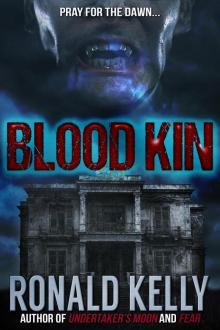 Blood Kin
Blood Kin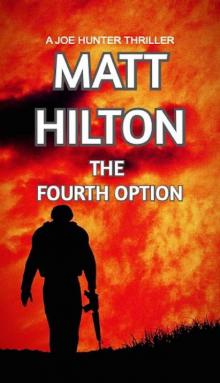 The Fourth Option
The Fourth Option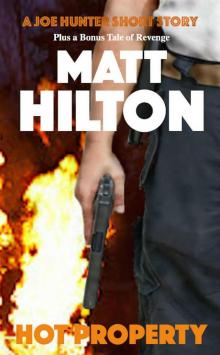 Hot Property: A Joe Hunter Short Story
Hot Property: A Joe Hunter Short Story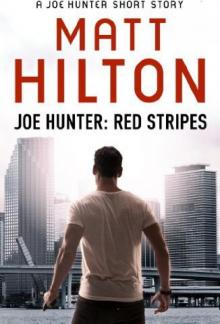 Red Stripes
Red Stripes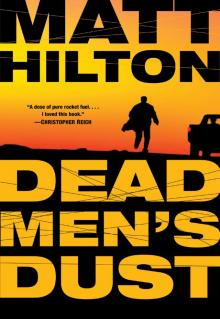 Dead Men's Dust
Dead Men's Dust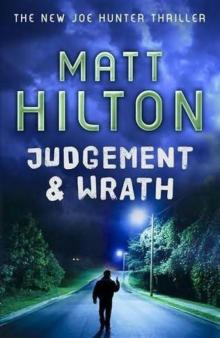 Judgement and Wrath
Judgement and Wrath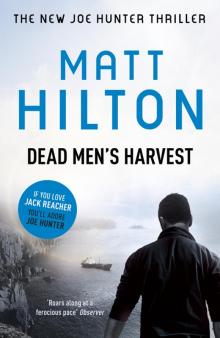 Dead Men's Harvest
Dead Men's Harvest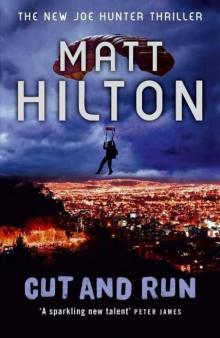 Cut and run jh-4
Cut and run jh-4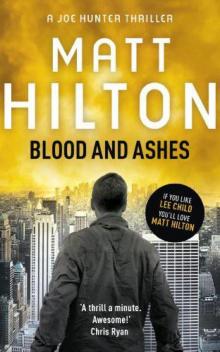 Blood and Ashes jh-5
Blood and Ashes jh-5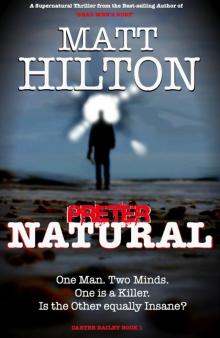 Preternatural: Carter Bailey Book 1
Preternatural: Carter Bailey Book 1 Darke
Darke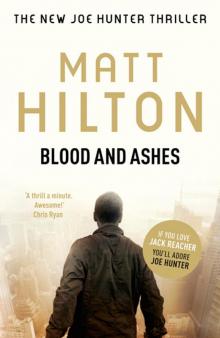 Blood and Ashes
Blood and Ashes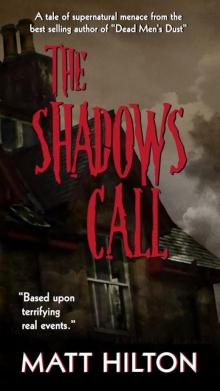 The Shadows Call
The Shadows Call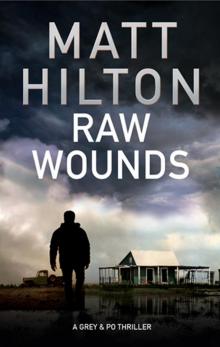 Raw Wounds
Raw Wounds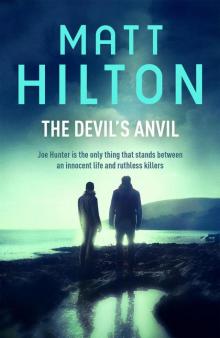 The Devil's Anvil
The Devil's Anvil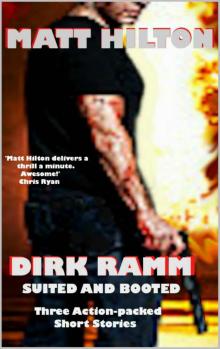 Dirk Ramm: Suited and Booted
Dirk Ramm: Suited and Booted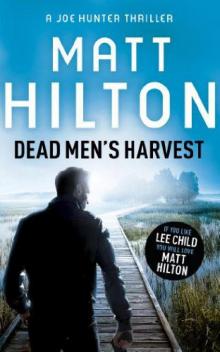 Dead Men's Harvest jh-6
Dead Men's Harvest jh-6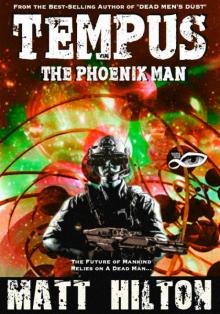 Tempus: The Phoenix Man
Tempus: The Phoenix Man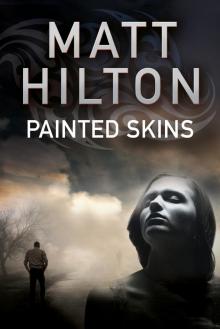 Painted Skins
Painted Skins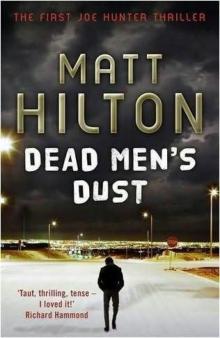 Dead Men's Dust jh-1
Dead Men's Dust jh-1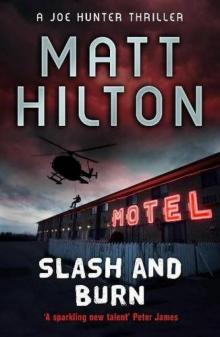 Slash and burn jh-3
Slash and burn jh-3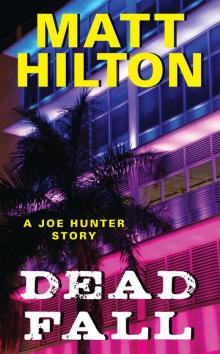 Dead Fall
Dead Fall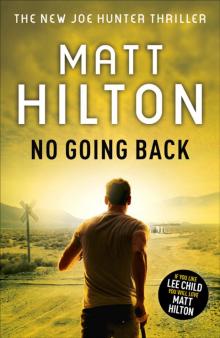 No Going Back - 07
No Going Back - 07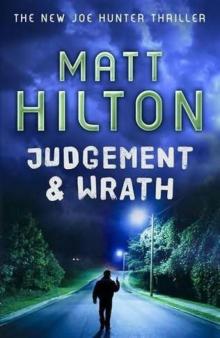 Judgement and Wrath jh-2
Judgement and Wrath jh-2